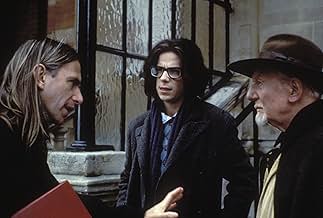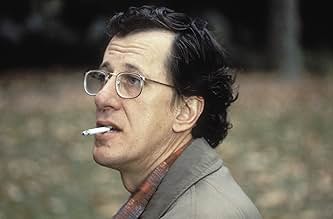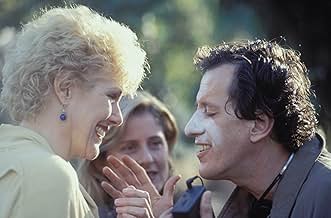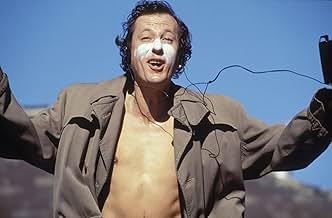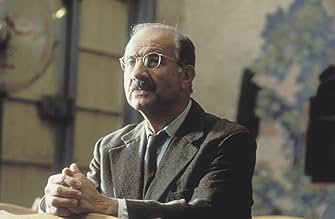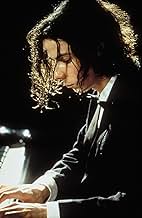IMDb रेटिंग
7.6/10
58 हज़ार
आपकी रेटिंग
अपने पिता और शिक्षकों द्वारा संचालित पियानोवादक डेविड हेल्फगोट, मानसिक तौर पर टूट जाता है। सालों बाद वह पियानो पर लौटता है, अगर महत्वपूर्ण प्रशंसा नहीं तो लोकप्रिय होने के लिए।अपने पिता और शिक्षकों द्वारा संचालित पियानोवादक डेविड हेल्फगोट, मानसिक तौर पर टूट जाता है। सालों बाद वह पियानो पर लौटता है, अगर महत्वपूर्ण प्रशंसा नहीं तो लोकप्रिय होने के लिए।अपने पिता और शिक्षकों द्वारा संचालित पियानोवादक डेविड हेल्फगोट, मानसिक तौर पर टूट जाता है। सालों बाद वह पियानो पर लौटता है, अगर महत्वपूर्ण प्रशंसा नहीं तो लोकप्रिय होने के लिए।
- 1 ऑस्कर जीते
- 46 जीत और कुल 52 नामांकन
फ़ीचर्ड समीक्षाएं
Okay, so I did some reading after this driven by idle curiosity about the account. The real Helfgott didn't spend 15 years abandoned in a room with a piano, he didn't have to stand in the rain outside of a bar before they would let him in. He was pretty well known in the local scene as a pianist, his father was not a Holocaust survivor and David had been married before. Father and son were never really estranged and David was present at his funeral.
But just the same, the 'objective' point-of-view that purports to explain him, or any of us at any time based on a few facts, is in the end no less hypocritical than any attempt to pass dramatization as 'the real story'. This matters. Someone can be present at a funeral without being truly present, and someone can feel forgotten and alone even when they're factually surrounded by people, estranged from a parent even when formally this was never so.
The film is at a simple emotional level where the attempt to conquer a maddening complexity (music, life) snaps the tethers of mind and in due time the reconfiguring of this damage into blossoming art. The moral is that we must keep trying and hope for the best, perhaps the worthiest lesson even if it appears slightly trite in the context of a more or less happy ending.
Still, why feel the need to invent all those things, knowing you are doing so? When the violence inflicted on the son could be inferred by a more ambiguous tension instead of an outright beating.
Because, it seems, we can only choose to accept the lesson if at the center we find a good soul worthy of the saving. In other words, it is not the fact that he gives a great last recital that matters, but that he plays at all; not that a genius was salvaged because he might never have been that, but a human being. And this is what rankles so much Helfgott's critics who find him borderline incompetent in his playing - he is cheered on in concerts because he is the character from this film.
Ideally we would be able to discern all these points here instead of one harmony: the truly damaged but kind soul, the inability to place blame for that damage on any ogre father or Holocaust, and being able to somehow experience his music (the real Helfgott recorded for the film) as a trained ear would, fixated flourishes followed by distraction and incompetence according to critics, musically extending the damaged self.
For a more demanding film on the same subject of madness and transcendent musical genius see a little known film on a medieval composer called Death in Five Voices: all about the dissonance between different voices trying to harmonize a story and this carried in the music itself.
But just the same, the 'objective' point-of-view that purports to explain him, or any of us at any time based on a few facts, is in the end no less hypocritical than any attempt to pass dramatization as 'the real story'. This matters. Someone can be present at a funeral without being truly present, and someone can feel forgotten and alone even when they're factually surrounded by people, estranged from a parent even when formally this was never so.
The film is at a simple emotional level where the attempt to conquer a maddening complexity (music, life) snaps the tethers of mind and in due time the reconfiguring of this damage into blossoming art. The moral is that we must keep trying and hope for the best, perhaps the worthiest lesson even if it appears slightly trite in the context of a more or less happy ending.
Still, why feel the need to invent all those things, knowing you are doing so? When the violence inflicted on the son could be inferred by a more ambiguous tension instead of an outright beating.
Because, it seems, we can only choose to accept the lesson if at the center we find a good soul worthy of the saving. In other words, it is not the fact that he gives a great last recital that matters, but that he plays at all; not that a genius was salvaged because he might never have been that, but a human being. And this is what rankles so much Helfgott's critics who find him borderline incompetent in his playing - he is cheered on in concerts because he is the character from this film.
Ideally we would be able to discern all these points here instead of one harmony: the truly damaged but kind soul, the inability to place blame for that damage on any ogre father or Holocaust, and being able to somehow experience his music (the real Helfgott recorded for the film) as a trained ear would, fixated flourishes followed by distraction and incompetence according to critics, musically extending the damaged self.
For a more demanding film on the same subject of madness and transcendent musical genius see a little known film on a medieval composer called Death in Five Voices: all about the dissonance between different voices trying to harmonize a story and this carried in the music itself.
This movie is definitely in my top five favorite movies of all time. It is unbelievably brilliant. Geoffrey Rush, dare I say, is perhaps the greatest actor of modern times. His performance alone is worth watching, let alone the outstanding supporting cast! Definitely not in typical Hollywood fashion, the movie is a truly great indie film. A must see for music lovers and indie film lovers alike.
This is a good film in every sense but will mean most to fathers with strong views :).
The story of a brilliant young pianist whose relationship with his father drives him to some sort of mental illness. Watchable, absorbing, brilliantly edited, deeply seriously moving, one of the rare films that pays attention to incidental sound. Wonderful direction and acting. This is a seriously good film.
The story of a brilliant young pianist whose relationship with his father drives him to some sort of mental illness. Watchable, absorbing, brilliantly edited, deeply seriously moving, one of the rare films that pays attention to incidental sound. Wonderful direction and acting. This is a seriously good film.
SHINE (1996) **** Geoffrey Rush, Noah Taylor, Alex Rafalowicz, Armin Mueller Stahl, Lynn Redgrave, Sir John Gielgud, Googie Withers. Excellent Oscar nominated bio pic about acclaimed Australian pianist virtuoso David Helfgott (played equally brilliant by Rush {deservingly winning the Oscar as Best Actor} as an adult, Taylor as a young man and Rafalowicz as the child prodigy) who suffered mental anguish thru his art largely due to his overbearing father (Mueller Stahl, Best Supporting Actor nominee, in a demanding yet effective role) that led to his nervous breakdown that nearly destroyed him. Poignant and beautifully directed by newcomer Scott Hicks (Best Director nominee), the film never panders, preaches or offers any simple answers yet does depict mental illness earnestly with devestating clarity. Rush gives a bravura performance that deserves a standing ovation. Best sequence: the lead-in to Helfgott's crash as he attempts the monumental musical challenge, Rachmaninoff's Piano Concerto #3, or notoriously known as "The Rach 3".
This was a very interesting movie and pleasant surprise, although sometimes that theme of the obsessive parent driving a kid crazy gets overworked. Nonetheless, it's a very well-made movie.
Geoffrey Rush is fascinating in the lead role as "David Helfgott." However, I would give equal kudos to Noah Taylor, who played Helfgott as a teenager, and to Armin Mueller-Stahl, who was Helfgott's father. They were just as impressive as Rush.
This is a supposedly true-life story of child prodigy piano player from Australia. As you can imagine, the music in here is excellent. Even better is the cinematography. Wow, this looks and sounds fantastic on DVD.
Although not always pleasant to watch, the story is riveting; hard to put down once you've started watching. The ending turned me off a bit with the overt plug for astrology, but is a happy one for all parties and at least leaves the viewer feeling satisfied.
In all, a very intense, beautifully-photographed biography.
Geoffrey Rush is fascinating in the lead role as "David Helfgott." However, I would give equal kudos to Noah Taylor, who played Helfgott as a teenager, and to Armin Mueller-Stahl, who was Helfgott's father. They were just as impressive as Rush.
This is a supposedly true-life story of child prodigy piano player from Australia. As you can imagine, the music in here is excellent. Even better is the cinematography. Wow, this looks and sounds fantastic on DVD.
Although not always pleasant to watch, the story is riveting; hard to put down once you've started watching. The ending turned me off a bit with the overt plug for astrology, but is a happy one for all parties and at least leaves the viewer feeling satisfied.
In all, a very intense, beautifully-photographed biography.
क्या आपको पता है
- ट्रिवियाGeoffrey Rush had once learned the piano up until aged fourteen. He took up piano lessons again thirty years later for this movie and also acted as his own hand double and body double.
- गूफ़The character shows all signs of schizophrenia; not bipolar disorder (formerly known as "manic-depressive disorder"), as is claimed in the film. The real David Helfgott likewise displays many symptoms of schizophrenia and none of bipolar disorder.
- भाव
Cecil Parkes: You must play as if there's no tomorrow.
- क्रेज़ी क्रेडिटHimself: hand double for Geoffrey Rush
- साउंडट्रैकWith A Girl Like You
Written by Reg Presley
© 1966 Dick James Music Limited
Performed by The Troggs
© 1966 Mercury Ltd. London
टॉप पसंद
रेटिंग देने के लिए साइन-इन करें और वैयक्तिकृत सुझावों के लिए वॉचलिस्ट करें
- How long is Shine?Alexa द्वारा संचालित
विवरण
- रिलीज़ की तारीख़
- कंट्री ऑफ़ ओरिजिन
- आधिकारिक साइटें
- भाषाएं
- इस रूप में भी जाना जाता है
- Tỏa Sáng
- फ़िल्माने की जगहें
- उत्पादन कंपनियां
- IMDbPro पर और कंपनी क्रेडिट देखें
बॉक्स ऑफ़िस
- बजट
- $55,00,000(अनुमानित)
- US और कनाडा में सकल
- $3,58,92,330
- US और कनाडा में पहले सप्ताह में कुल कमाई
- $1,62,179
- 24 नव॰ 1996
- दुनिया भर में सकल
- $3,59,99,121
- चलने की अवधि
- 1 घं 45 मि(105 min)
- रंग
- ध्वनि मिश्रण
- पक्ष अनुपात
- 1.85 : 1
इस पेज में योगदान दें
किसी बदलाव का सुझाव दें या अनुपलब्ध कॉन्टेंट जोड़ें




